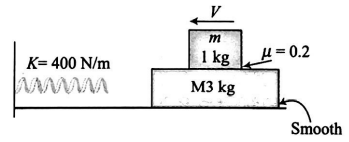- Tardigrade
- Question
- Physics
- As shown in the figure, there is no friction between the horizontal surface and the lower block (M=3 kg ) but friction coefficient between both the blocks is 0.2. Both the blocks move together with initial speed V towards the spring, compresses it and due to the force exerted by the spring, moves in the reverse direction of the initial motion. Find the maximum value of V (in cm / s ) so that during the motion, there is no slipping between the blocks. (use .g=10 m / s 2).
Q.
As shown in the figure, there is no friction between the horizontal surface and the lower block $(M=3\, kg )$ but friction coefficient between both the blocks is $0.2$. Both the blocks move together with initial speed $V$ towards the spring, compresses it and due to the force exerted by the spring, moves in the reverse direction of the initial motion. Find the maximum value of $V$ (in $cm / s$ ) so that during the motion, there is no slipping between the blocks. (use $\left.g=10\, m / s ^{2}\right)$.
Work, Energy and Power
Report Error
Solution:
Maximum chance of slipping occurs when spring is maximum compressed. At this moment, as force exerted by the spring is maximum, acceleration of the system is maximum.
Hence maximum friction force is required at this moment.
By W/E theorem
$\frac{1}{2}(M+m) V^{2}=\frac{1}{2} k x_{m}^{2}$
$\Rightarrow x_{m}=\sqrt{\frac{(M+m) V^{2}}{K}}$
Now for upper block $a_{m}=\frac{k x_{m}}{M+m}$
Force on upper block is provided by the friction force. Therefore
$\mu m g \geq \frac{k x_{m} \cdot m}{M+m}$
For limiting value $V=\mu g \sqrt{\frac{M+m}{k}}$
Using values $V_{\text {maximum }}=20\, cm / s$
Questions from Work, Energy and Power
1. Identify the false statement from the following
KEAM 2010
Physics Most Viewed Questions
1. A car starts from rest and accelerates at $5\, m / s ^{2}$ At $t=4\, s$, a ball is dropped out of a window by a person sitting in the car. What is the velocity and acceleration of the ball at $t =6\, s$ ? (Take $\left. g =10\, m / s ^{2}\right)$
NEET 2021
Motion in a Straight Line
2. If $E$ and $G$ respectively denote energy and gravitational constant, then $\frac{ E }{ G }$ has the dimensions of:
NEET 2021
Physical World, Units and Measurements
3. The de Broglie wavelength of an electron moving with kinetic energy of $144 \,eV$ is nearly
NEET 2020
Dual Nature of Radiation and Matter
Latest Updates
- JEE Main 2023 February 25th Shift 1 Morning
- JEE Main 2023 February 25th Shift 2 Evening
- JEE Main 2023 January 31st Shift 1 Morning
- JEE Main 2023 January 31st Shift 2 Evening
- JEE Main 2023 January 30th Shift 1 Morning
- JEE Main 2023 January 30th Shift 2 Evening
- JEE Main 2023 January 25th Shift 1 Morning
- JEE Main 2023 January 25th Shift 2 Evening
- JEE Main 2023 January 24th Shift 1 Morning
- JEE Main 2023 January 24th Shift 2 Evening
- JEE Main 2023 February 1st Shift 1 Morning
- JEE Main 2023 February 1st Shift 2 Evening
- JEE Main 2022 July 25th Shift 1 Morning
- JEE Main 2022 July 25th Shift 2 Evening
- JEE Main 2022 July 26th Shift 1 Morning
- JEE Main 2022 July 28th Shift 1 Morning
- JEE Advanced 2022 Paper 2
- JEE Advanced 2022 Paper 1
- JEE Advanced 2021 Paper 2
- JEE Advanced 2021 Paper 1
- JEE Advanced 2020 Paper 2
- JEE Advanced 2020 Paper 1
- NEET 2022 Physics Answer Key
- NEET 2022 Chemistry Answer Key
- NEET 2022 Botany Biology Answer Key
- NEET 2022 Zoology Biology Answer Key
- NEET Rank Predictor 2023
